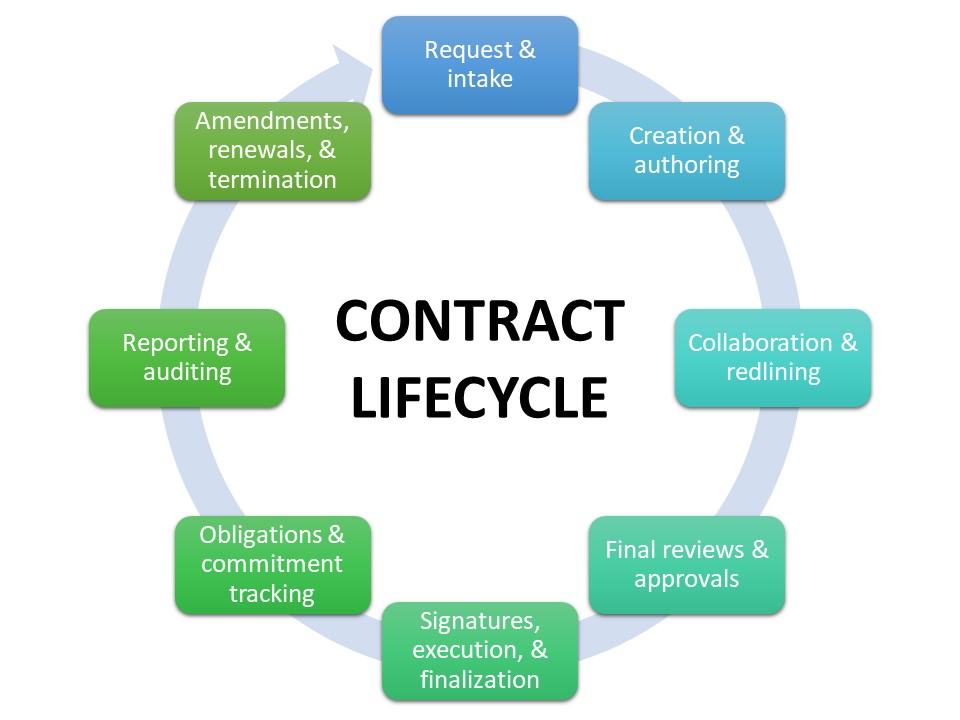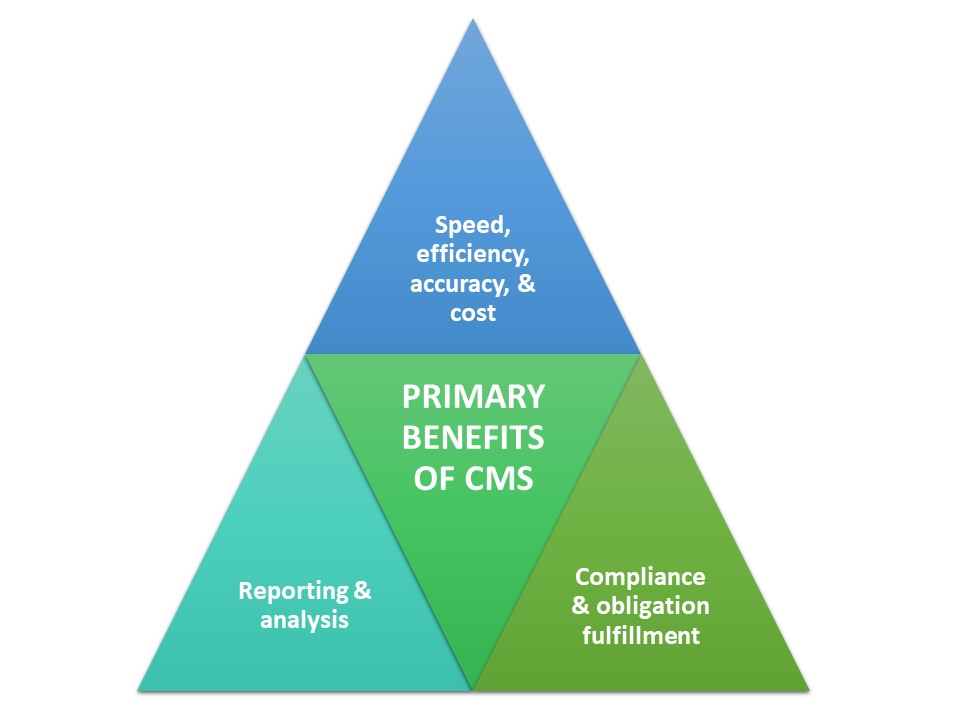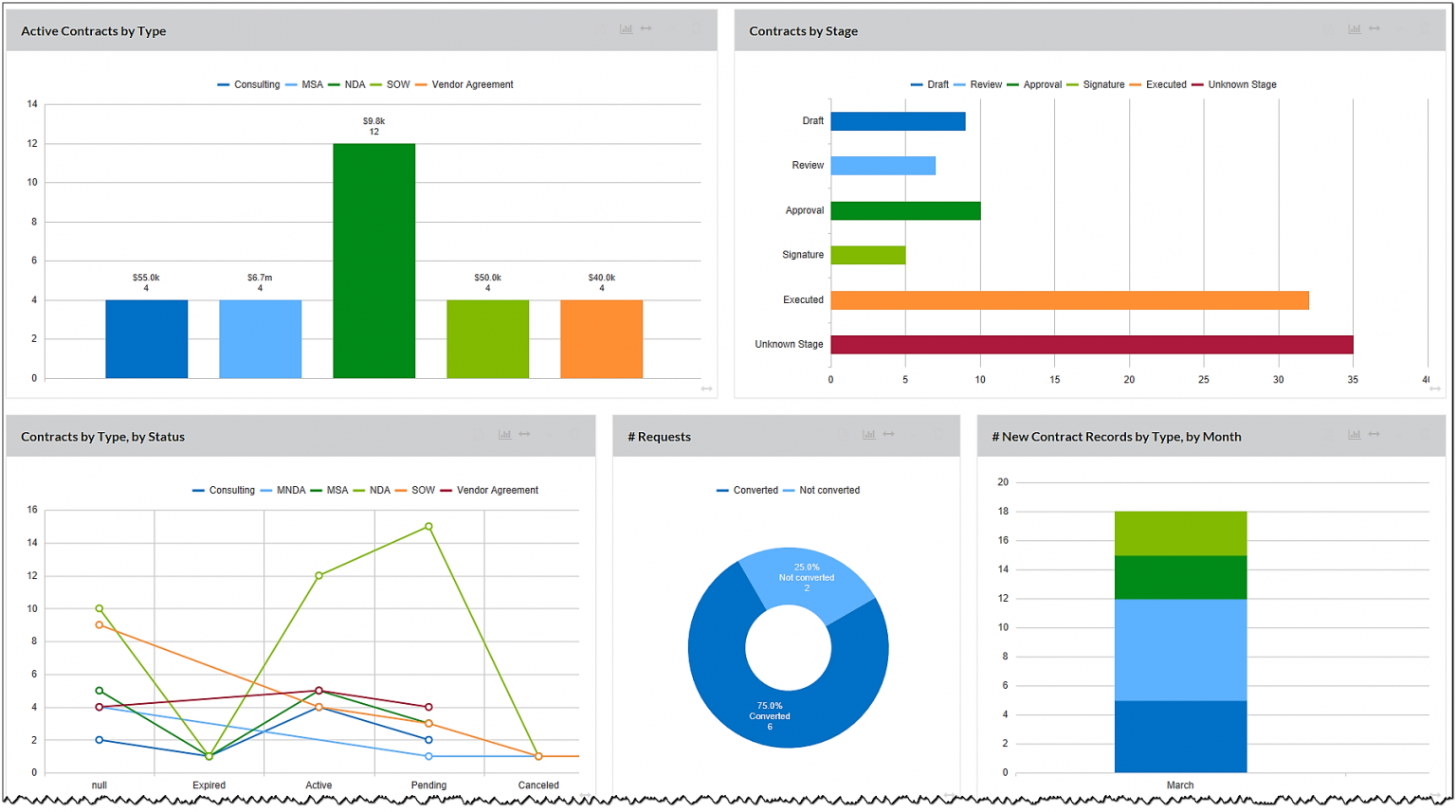What to Look for in a Contracting System
If you need to modernize your contract management process, do you know what to look for in an automated contracting system? Not every contracting system (aka contract management software or CLM software) is created equal, and some offer more features than others. That said, there are several essential features your organization needs, which you need to look for when evaluating different options.
Key Takeaways
- Contract management systems automate the entire contract lifecycle from request/intake through creation, negotiation, approval, and ongoing management
- A contracting system improves operational efficiency, speeds up the contract lifecycle, reduces errors, and ensures you meet all contracted obligations
- Look for a contracting system that offers a central contract repository, robust search capability, clause & template library, workflow management, eSignatures, automated alerts, and easy-to-use dashboards and reports
What is a Contracting System?
A contracting system, also known as contract lifecycle management (CLM) software or contract management software, automates and helps you manage the entire contract lifecycle, from inception to execution to reporting and beyond. You engage with CLM software at the beginning of the process using contract request and intake forms with information that can be used to assemble contracts via preapproved contract templates with standard terms, conditions, and language. The CLM manages the rest of the process through final contract storage, which is done in a centralized digital repository.

Using a contracting system/CLM provides numerous benefits to your organization, including the following:
- Fewer errors
- Increased efficiency
- Reduced costs (up to 60% lower, according to Deloitte)
- Real-time data
- Improved regulatory compliance, thanks to preapproved contract templates and a detailed digital audit trail
- Improved obligation fulfillment and tracking to mitigate risk
- Better renewal management

These are all good reasons why 76% of those organizations surveyed by accounting firm KPMG say that moving to a digital CLM is a top priority.
10 Essential Features to Look for in a Contracting System (CLM)
When you’re looking to deploy a contracting system, you need to ensure it has all the features your organization needs. To that end, here are ten essential features you need in a contract management system.
Central Contract Repository
One of the key components of a CLM is a central contract repository. This repository provides archival storage and security for all digital contracts and is easily and appropriately accessible by authorized employees. It centralizes all contracts in your organization so that no contracts are stored in individual departments or branches, thus creating a single source of truth when it comes to the contracts your business uses. It also eliminates the unsecure and risky approach to storing contracts in shared drives like SharePoint or DropBox where contracts might be misplaced, inappropriately accessed, or even deleted.
Supporting Document Storage
This central contract repository should also digitally store all supporting documents. This includes background information, certificates of insurance, project schedules, pricing schedules, cost estimates, the scope of work documents, and similar files. By storing all supporting documents in a central location, you make all important information secure and searchable. You can also easily set up parent-child relationships for various contract types making all related contract information easy to find.
Robust Search Capability
Storing contracts and supporting documents digitally enables robust searching for both individual contracts and specific pieces of information. Keyword searches, enabled by the use of metadata and sophisticated search technologies, can find content within a single document or across multiple documents. For example, perhaps you want to locate all contracts that contain an indemnification clause. This is a simple search that will yield all the results which can then be easily exported into a report.
Online Contract Request & Intake Forms
Capturing all of the required information to assemble, review, and approve a contract right up front in your process is key to speed and accuracy. After all, endless back and forth emails with questions about what’s required for a contract are inefficient and time-consuming. By standardizing and centralizing your contract request and intake process using easy-to-populate forms, you will significantly accelerate and improve your contract management efforts. Contract management software from Contract Logix makes this very simple to implement.
Clause & Template Library
Another essential component of any contracting system is a library of your contract templates. Instead of starting each new contract from scratch, which is both time-consuming and prone to errors, all new contracts are based on templates that include your preapproved language and content. Additional content can be added based on the needs of each contract, but the entire process is more efficient and less prone to human error.
The template library should be accompanied by a selection of preapproved content – terms, clauses, and the like – again, using your standardized and preapproved legal language. This enables all new contracts to meet your organization’s legal and financial standards while discouraging rogue actors from going off-script with their own unique contract contents.
Workflow and Approval Management
Core to any contracting system is automated workflow and approval management. When a new contract is entered into the CMS, it is automatically routed to the proper parties for evaluation and approval. This speeds up the entire process and minimizes lost, misplaced, or delayed contracts. It also ensures compliance with your business rules as well as those of any regulatory bodies. Automated workflows are a great way to accelerate your process while mitigating risk.
Real-time Collaboration Tools
The collaboration and negotiation phase of contract management can be wrought with friction and inefficiencies which can ultimately cost you a deal. It’s important for a CLM to have real-time contract collaboration tools that can help ease your negotiation efforts by supporting concurrent editing, messaging, and commenting both internally and with third parties. Some solutions like Contract Logix also capture a complete history of all changes for auditing and give you visibility into who is involved in the negotiation process.
eSignature Integration
Another feature that speeds up contract execution is the use of eSignatures. Instead of (slowly) routing a paper document for key players to sign, all players are presented with a digital contract that they can sign electronically. eSignatures are legally binding, easy to track, verify, and highly secure. Contract management software from Contract Logix has packaged integrations with many of the leading e-signature providers.
Automated Alerts
How many times has your firm missed a contracted deadline – or had a partner that didn’t deliver on time? To ensure that all contractual obligations are fulfilled, look for a CLM that tracks all contract deadlines and obligations and automatically issues alerts when deadlines approach. You’ll never again have to worry about manually setting calendar reminders or missing the termination window of a contract with an autorenewal you want to cancel. Plus, you set automated alert rules for contract types to make this scale across your business.
Easy-to-Use Dashboards & Detailed Reporting
Paper contracts are difficult to keep track of. The progress and location of digital contracts, on the other hand, are easily tracked. Look for a contracting system that offers easy-to-use contract dashboards that show the status of all your in-progress contracts and provide useful data about those contracts. A visual dashboard lets you grasp key metrics at a glance, including:
- Number of active contracts
- Number of new contracts
- Number of contracts by type
- State of active contracts
- Total contract value
- Contracts expiring soon

It’s also important you have a contracting system that provides detailed reports on all your contract-related activities. These reports can be automatically generated at the end of a given period or created on-demand as management needs them. The more useful data you can extract from your contracts, the more intelligent decisions you can make for your business and future contracts.
SOURCE: John Chapman via YouTube
Turn to Contract Logix for Full-Featured Contract Management Systems
When you want to implement a full-featured CLM solution, turn to the experts at Contract Logix. We’ve helped thousands of companies across various industries automate their contract operations with robust and data-driven CLM solutions. Our CLM Platform automates the entire contract workflow, facilitates real-time collaboration, supports easy-to-build clause and template libraries, creates a central contract repository, and enables robust searching and reporting.
Contact us to learn more about our available solutions and pricing models so you can start automating your contract lifecycle today!


